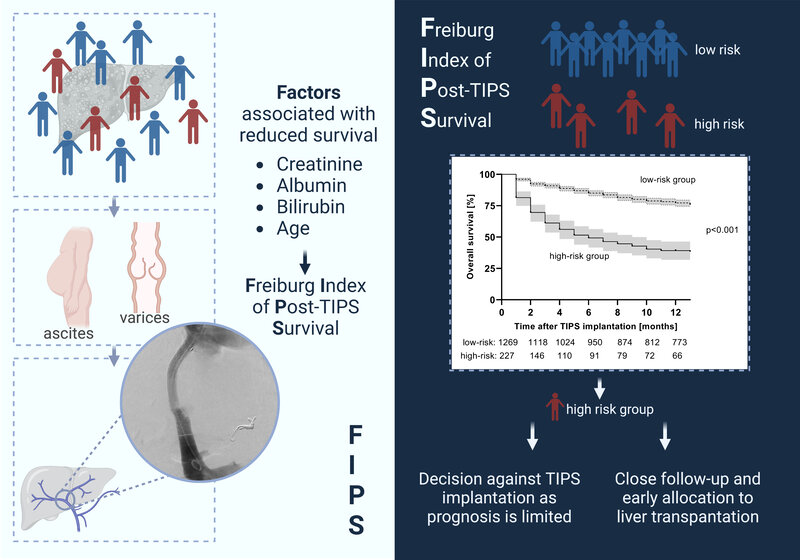The Freiburg index of post-TIPS survival (FIPS)
Der FIPS-Score zur individualisierten Therapie der Portalen Hypertension bei TIPS-Anlagen
Using the FIPS score, an individual prognosis for each patient can be calculated estimating survival probability at one, three and six months after TIPS implantation. Created with BioRender.com
Implantation of a transjugular intrahepatic portosystemic shunt (TIPS) is a safe and effective treatment of clinically significant portal hypertension in patients with liver cirrhosis. TIPS implantation is performed in patients with treatment refractory ascites and for secondary prophylaxis of variceal bleeding. Further, early
TIPS implantation within 72 hours after acute variceal bleeding is recommended in patients with a high risk for re-bleeding.
During the last 30 years, the technique of TIPS implantation has markedly improved and is nowadays associated with low procedural and shunt-related complication rates (Bettinger D. et al., Aliment Pharmacol Ther. 2016 Nov;44(10):1051-1061). However, patients that require TIPS implantation have experienced one or more decom- pensating events during their course of disease and therefore, these patients have to be considered a patient cohort with a high mortality risk per se. Accordingly, risk stratification in these patients is of great relevance. Several scores, such as the MELD score or the Child-Pugh score have been applied for this purpose, however, these prognostic scores have important drawbacks in the setting of TIPS implantation.
Therefore, we set out to establish an alternative score for defining survival in patients with TIPS implantation for treatment refractory ascites or secondary prophylaxis of variceal bleeding (Bettinger D. et al., J Hepatol. 2021 Jun;74(6):1362-1372).
In our analyses, age, bilirubin, albumin and creatinine were included in a new risk score which is named the
Freiburg index of post-TIPS survival (FIPS)
A FIPS score ≥0.92 indicates high-risk patients as this cut-off value is linked to significantly reduced survival following TIPS implantation (median overall survival: 5.0 [3.1 - 6.9] months).
In these patients decision against TIPS implantation should be discussed and/or close follow-up should be planned in order to achieve early allocation to liver transplantation if feasible.

